~Chapter XV. Noun Clauses
英语名词性从句的用法
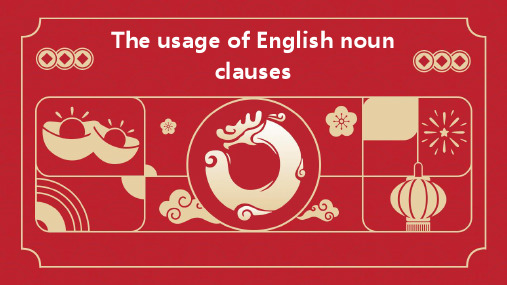
Type
Parallel noun clauses
Parallel noun clauses are two or more simple noun clauses connected by parallel conjunctions.
Subordinate noun clause
A subordinate noun clause is a simple or complex noun clause that is part of another simple or complex noun clause.
03 Common errors in non claims
CHAPTER
Missing guide words
Summary word
Lack of guiding words
Detailed description
In English noun clauses, guide words are essential, such as "that", "which", "who", etc. Lack of these guide words can lead to incomplete sentence structure or unclear meaning.
In some cases, using noun clauses can simplify sentence structure and make sentences more concise and clear.
02 How to use noun clauses?
CHAPTER
Selection of guide words
英语各大从句知识点总结
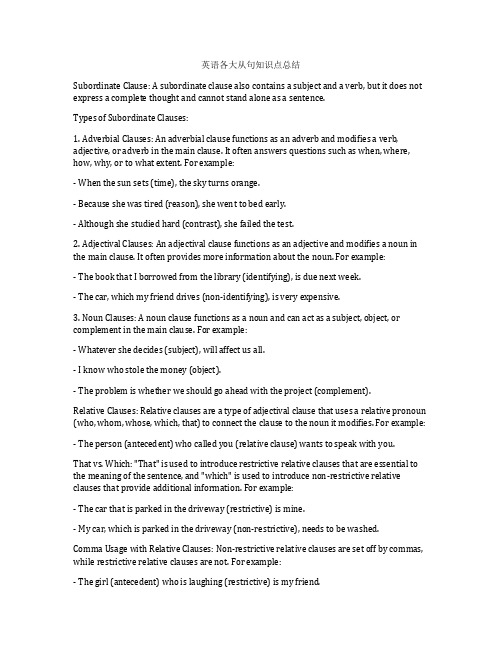
英语各大从句知识点总结Subordinate Clause: A subordinate clause also contains a subject and a verb, but it does not express a complete thought and cannot stand alone as a sentence.Types of Subordinate Clauses:1. Adverbial Clauses: An adverbial clause functions as an adverb and modifies a verb, adjective, or adverb in the main clause. It often answers questions such as when, where, how, why, or to what extent. For example:- When the sun sets (time), the sky turns orange.- Because she was tired (reason), she went to bed early.- Although she studied hard (contrast), she failed the test.2. Adjectival Clauses: An adjectival clause functions as an adjective and modifies a noun in the main clause. It often provides more information about the noun. For example:- The book that I borrowed from the library (identifying), is due next week.- The car, which my friend drives (non-identifying), is very expensive.3. Noun Clauses: A noun clause functions as a noun and can act as a subject, object, or complement in the main clause. For example:- Whatever she decides (subject), will affect us all.- I know who stole the money (object).- The problem is whether we should go ahead with the project (complement).Relative Clauses: Relative clauses are a type of adjectival clause that uses a relative pronoun (who, whom, whose, which, that) to connect the clause to the noun it modifies. For example: - The person (antecedent) who called you (relative clause) wants to speak with you.That vs. Which: "That" is used to introduce restrictive relative clauses that are essential to the meaning of the sentence, and "which" is used to introduce non-restrictive relative clauses that provide additional information. For example:- The car that is parked in the driveway (restrictive) is mine.- My car, which is parked in the driveway (non-restrictive), needs to be washed.Comma Usage with Relative Clauses: Non-restrictive relative clauses are set off by commas, while restrictive relative clauses are not. For example:- The girl (antecedent) who is laughing (restrictive) is my friend.- The girl, who is laughing, (non-restrictive) is my friend.Using "Wh-" Words in Noun Clauses: Noun clauses often begin with "wh-" words such as "what," "who," "when," "where," "which," "why," and "how."Example: I don't know who will be attending the meeting.Using Subordinating Conjunctions: Adverbial clauses often begin with subordinating conjunctions such as "because," "although," "when," "while," "before," "after," "if," "since," and "unless."Example: Since it was raining, we decided to stay inside.Incorporating Subordinate Clauses: Subordinate clauses can be incorporated into major clauses to add complexity and variety to sentences. This can be done through subordination (when the subordinate clause comes before the main clause) or coordination (when the subordinate clause comes after the main clause).Example of Subordination: Although he was tired, John continued working on the project. Example of Coordination: John continued working on the project, even though he was tired. Understanding the differences between major and subordinate clauses, as well as the various types of subordinate clauses, can help improve the complexity and clarity of your writing. By mastering the use of these clauses, you can create more sophisticated and nuanced sentences.。
各种语法术语的英文名称
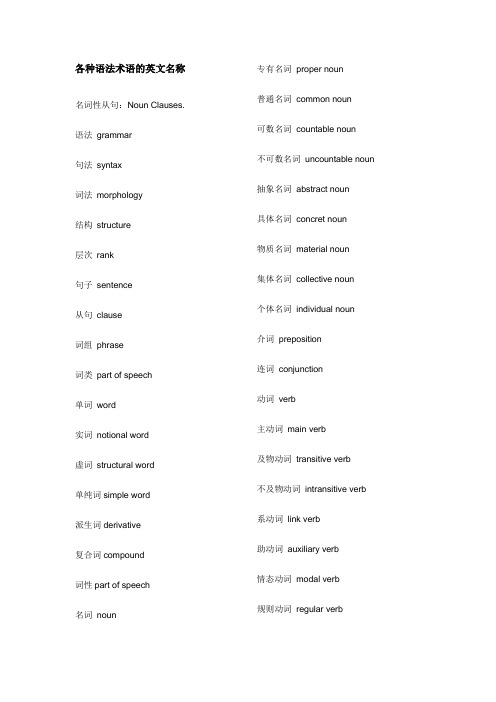
各种语法术语的英文名称名词性从句:Noun Clauses. 语法grammar句法syntax词法morphology结构structure层次rank句子sentence从句clause词组phrase词类part of speech单词word实词notional word虚词structural word单纯词simple word派生词derivative复合词compound词性part of speech名词noun 专有名词proper noun普通名词common noun可数名词countable noun不可数名词uncountable noun 抽象名词abstract noun具体名词concret noun物质名词material noun集体名词collective noun个体名词individual noun介词preposition连词conjunction动词verb主动词main verb及物动词transitive verb不及物动词intransitive verb 系动词link verb助动词auxiliary verb情态动词modal verb规则动词regular verb不规则动词irregular verb短语动词phrasal verb限定动词finite verb非限定动词infinite verb使役动词causative verb感官动词verb of senses动态动词event verb静态动词state verb感叹词exclamation形容词adjective副词adverb方式副词adverb of manner 程度副词adverb of degree 时间副词adverb of time地点副词adverb of place修饰性副词adjunct连接性副词conjunct疑问副词interogative adverb 关系副词relative adverb 代词pronoun人称代词personal pronoun物主代词possesive pronoun反身代词reflexive pronoun相互代词reciprocal pronoun指示代词demonstrative pronoun疑问代词interrogative pronoun关系代词relative pronoun不定代词indefinite pronoun物主代词possecive pronoun名词性物主代词nominal possesive prnoun形容词性物主代词adjectival possesive pronoun冠词article定冠词definite article不定冠词indefinite article数词numeral基数词cardinal numeral序数词ordinal numeral分数词fractional numeral形式form单数形式singular form复数形式plural form限定动词finite verb form非限定动词non-finite verb form原形base form从句clause从属句subordinate clause并列句coordinate clause名词从句nominal clause定语从句attributive clause状语从句adverbial clause宾语从句object clause主语从句subject clause同位语从句appositive clause时间状语从句adverbial clause of time地点状语从句adverbial clause of place 方式状语从句adverbial clause of manner 让步状语从句adverbial clause of concession原因状语从句adverbial clause of cause 结果状语从句adverbial clause of result目的状语从句adverbial clause of purpose条件状语从句adverbial clause of condition真实条件状语从句adverbial clause of real condition非真实条件状语从句adverbial clause of unreal condition含蓄条件句adverbial clause of implied condition错综条件句adverbial clause of mixed condition句子sentence简单句simple sentence并列句compound sentence复合句complex sentence并列复合句compound complex sentence 陈述句declarative sentence疑问句interrogative sentence一般疑问句general question特殊疑问句special question选择疑问句alternative question 附加疑问句tag question反义疑问句disjunctive question 修辞疑问句rhetorical question感叹疑问句exclamatory question 存在句existential sentence肯定句positive sentence基本句型basic sentence patern 否定句negative sentence祈使句imperative sentence省略句elliptical sentence感叹句exclamatory sentence句子成分members of sentences 主语subject谓语predicate宾语object双宾语dual object 直接宾语direct object间接宾语indirect object复合宾语complex object同源宾语cognate object补语complement主补subject complement宾补object complement表语predicative定语attribute同位语appositive状语adverbial句法关系syntatic relationship 并列coordinate从属subordination修饰modification前置修饰pre-modification后置修饰post-modification限制restriction双重限制double-restriction非限制non-restriction数number单数形式singular form复数形式plural form规则形式regular form不规则形式irregular form 格case普通格common case所有格possessive case 主格nominative case宾格objective case性gender阳性masculine阴性feminine通性common中性neuter人称person第一人称first person第二人称second person 第三人称third person时态tense过去将来时past future tense过去将来进行时past future continuous tense过去将来完成时past future perfect tense 一般现在时present simple tense一般过去时past simple tense一般将来时future simple tense现在完成时past perfect tense过去完成时present perfect tense将来完成时future perfect tense现在进行时present continuous tense过去进行时past continuous tense将来进行时future continuous tense过去将来进行时past future continuous tense现在完成进行时present perfect continuous tense过去完成进行时past perfect continuous tense语态voice主动语态active voice被动语态passive voice语气mood陈述语气indicative mood 祈使语气imperative mood 虚拟语气subjunctive mood 否定negation否定范围scope of negation 全部否定full negation局部否定partial negation 转移否定shift of negation 语序order自然语序natural order倒装语序inversion全部倒装full inversion部分倒装partial inversion 直接引语direct speech间接引语indirect speech 自由直接引语free direct speech自由间接引语free indirect speech一致agreement主谓一致subject-predicate agreement 语法一致grammatical agreement概念一致notional agreement就近原则principle of proximity强调emphasis重复repetition语音pronunciation语调tone升调rising tone降调falling tone降升调falling-rising tone文体style正式文体formal非正式文体informal口语spoken/oral English套语formulistic expression英国英语British English美国英语American English 用法usage感情色彩emotional coloring 褒义commendatory贬义derogatory幽默humorous讽刺sarcastic挖苦ironic。
英语从句知识点总结
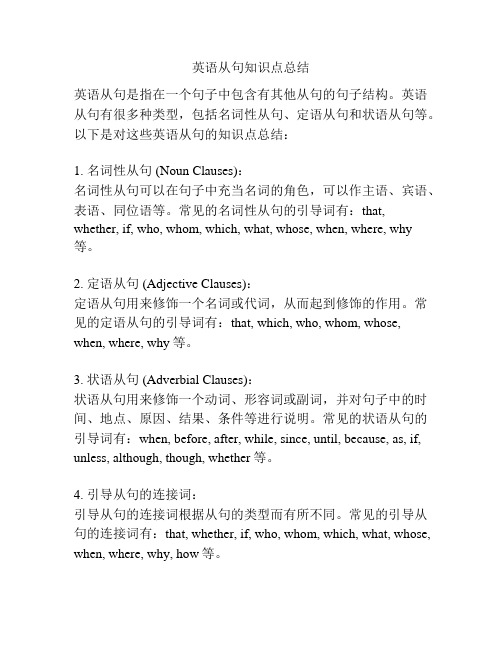
英语从句知识点总结英语从句是指在一个句子中包含有其他从句的句子结构。
英语从句有很多种类型,包括名词性从句、定语从句和状语从句等。
以下是对这些英语从句的知识点总结:1. 名词性从句 (Noun Clauses):名词性从句可以在句子中充当名词的角色,可以作主语、宾语、表语、同位语等。
常见的名词性从句的引导词有:that, whether, if, who, whom, which, what, whose, when, where, why等。
2. 定语从句 (Adjective Clauses):定语从句用来修饰一个名词或代词,从而起到修饰的作用。
常见的定语从句的引导词有:that, which, who, whom, whose, when, where, why等。
3. 状语从句 (Adverbial Clauses):状语从句用来修饰一个动词、形容词或副词,并对句子中的时间、地点、原因、结果、条件等进行说明。
常见的状语从句的引导词有:when, before, after, while, since, until, because, as, if, unless, although, though, whether等。
4. 引导从句的连接词:引导从句的连接词根据从句的类型而有所不同。
常见的引导从句的连接词有:that, whether, if, who, whom, which, what, whose, when, where, why, how等。
5. 从句的位置:从句可以出现在主句前面、中间或后面,具体的位置取决于从句的类型和句子的结构。
6. 省略从句的连接词:在某些情况下,从句的连接词可以省略,只保留从句的其他成分,例如主语、谓语等。
7. 从句的语序:从句的语序与主句的语序有所不同。
在陈述语序中,从句的语序和主句的语序一致;而在疑问语序中,从句的语序要倒装。
以上是英语从句的一些基本知识点总结。
英语中从句类型

英语中从句类型
英语中的从句有以下几种类型:
1. 名词性从句(Noun Clauses):名词性从句在句子中起到名
词的作用,可以作主语、宾语、表语或同位语。
常见的名词性从句
包括宾语从句、主语从句、表语从句和同位语从句。
2. 定语从句(Adjective Clauses):定语从句用来修饰名词
或代词,并且不能独立存在。
通常由关系代词(who, whom, whose, which, that)或关系副词(where, when, why)引导。
3. 状语从句(Adverbial Clauses):状语从句可以表示时间、原因、条件、目的、结果、方式等状语关系。
常见的引导词有连词(while, when, because, if, unless, although, since, etc.)
和疑问词(where, when, why, how, etc.)。
4. 同位语从句(Appositive Clauses):同位语从句用来进一
步解释或说明前面的名词或代词,常由that引导,有时也可以用其
他关系词引导。
5. 感叹句型从句(Exclamatory Clauses):感叹句型从句用
来表示强烈的感情或感叹,通常由what, how, what a引导。
6. 名词化从句(Nominalization Clauses):名词化从句是将
一个完整的句子转化为一个名词,函数如同名词,可以作为主语、
宾语、表语等。
常见的名词化从句有不定式、动名词和现在分词作
为名词的一部分。
这些是英语中常见的从句类型,根据情况的不同,从句的结构和用法会有所变化。
Clauses

Noun clauses (4)
• 表语从句 1. That 类表从: The trouble is that we never have enough time. 2. Whether 类表从:The question is whether her parents will agree with her. 3. wh-类表从(连接代词who, whom, whose, what, which, whoever, whatever, whichever等和连接副词 where, when, how, why, wherever, whenever等): The problem is who we can get to help us.) 4. As/as though/as if类表从:It sounds as if someone is knocking at the door. 5. Because 类表从:It was because he didn’t know her.
Reading assignment
• Read your notes at least THREE times. • Get ready to be tested next week. • No yy reading.
Attributive clauses (3)
• 用 which不用that的情况:
1. 关系代词前有介词且指事物时 2. 非限制性定从中 3. 先行词本身是that:What’s that which is flashing in the sky? 4. 先行词后有插入语: This is the grammar book which, as I told you, will help you a lot.
语法术语中英文

语法术语中英文1. Noun (名词)countable uncountable (可数名词、不可数名词)Number of N (名词的数)Irregular plurals (不规那么复数)Genitive case of N (名词的所有格)Double genitive (双重所有格)2.Pronoun (代词)Personal pronoun (人称代词)Possessive pronoun (物主代词)Reflexive pronoun (反身代词)Interrogative pronoun (疑问代词)Indefinite pronoun (不定代词)3.Numeral (数次)Cardinal 、ordinal numbers (基数词、序数词)Percentage (百分数)Fraction (分数)Decimal (小数)Multiple (倍数)4.Determiner (限定词)Definite, indefinite, zero articles (定冠词,不定冠词,零冠词)Quantifiers (数量词)5.Preposition (介词)6.Adjective (形容词)Attributive 定语Predicative 表语Adverb clause equivalent 副词性从句7. Adverb (副词)Modifier of Adj / Adv / Prep-phrase / N-Phrase / Adverb-clause (形容词、副词、介词短语、副词性从句的修饰语)The comparative and superlative degrees of Adj / Adv (形容词和副词的比较级和最高级)9. Verb classes (动词)Transitive and intransitive verbs(及物动词和不及物动词)Auxiliaries and modal auxiliaries(助动词和情态动词)Semi-auxiliaries (半助动词)Phrasal verbs (短语动词)10. Tense (时态)Simple present, past, future and with modals (一样此刻时,一样过去时,一样以后时和情态助动词加动词)Present and past progressive(此刻进行时和过去进行时)Future progressive and with modals(以后进行时和情态动词加进行时)Present and past perfect(此刻完成时和过去完成时)Future perfect and with modals (以后完成时和情态动词加完成时)Present perfect progressive(此刻完成进行时)Past perfect progressive (过去完成进行时)voice (被动语态)Passive voice in simple tense(被动语态的一样时态)Passive voice in perfect and progressive tenses (被动语态的完成和进行时态)Passive voice of phrasal verbs (短语动词的被动语态)12.Subjunctive mood (虚拟语气)13.To V (Infinitive 动词不定式)as subject, object and complement (用作主语,宾语和补足语)Indicating purpose / result (表示目的和结果)Modifying adjective (修饰形容词)as post modifier in a noun phrase (后位修饰名词)to be + V-ed2, to have + V-ed2, to be + V-ing (不定式的被动式,完成式和进行式)14.V-ing (Gerund 动名词)object, subject and predicative (宾语, 主语和表语)N / Pronouns or their possessive + V-ing as subject and object (名词/ 代词或其所有格加动名词作主语和宾语)Prep + N / Pronouns or their possessive + V-ing (介词加名词/代词或其所有格加动名词)being + V-ed2, having + V-ed2, having been + V-ed2 as a noun equivale nt (动名词的被动式,完成式和完成被动式起名词作用)15pre-modifier and post modifier in a noun phrase 此刻分词和过去分词)as complement (补足语)as an adverb clause equivalen t(作状语)When / while, etc. + V-ing / V-ed2 (When / While 等加此刻分词或过去分词)(with) N + V-ing / V-ed2 ( [ with ] 名词加此刻分词或过去分词)Dangling V-ing as adverb clause equivalen t(无归属此刻分词作状语)being + V-ed2, having + V-ed2, having been + V-ed2 as an adverb or adjective clause equivalen t(此刻分词的被动式、完成式和完成被动式作状语或定语)16. Basic sentence patterns and sentence elements (大体句型和句子成份)Pattern 1: S + VPattern 2: S + V + CsPattern 3: S + V + OPattern 4: S + V + Oi + OdPattern 5: S + V + Od + Co17. Interrogative form (疑问形式)Negative form (否定形式)Passive form (被动形式)relative clause (定语从句)Restrictive and non-restrictive (限制Pare nt hesis (插入语)Omission (省略)Omission through coordination (并列结构中的省略)Negation (否定)Total negation (全数否定)Partial negation (部份否定)Double negation (双重否定)Transferred negation (转移否定)性和非限制性定语从句)Appositive clause (同位语从句)Noun phrase appositive to clause(名词短语作句子的同位语)Clause of time and space(时刻从句和地址从句)Clauses of condition, concession and con tras t (条件从句、妥协从句和对照从句)Clauses of cause, result and purpose(缘故从句、结果从句和目的从句)Clauses of manner and comparison(方式从句和比较从句)Clauses of proportion and other types(比例从句和其它从句)3rd person pronouns, and plurals of the 1st and 2nd person pronouns (第三人称代词,第一、二人称代词的复数)indefinite pronouns (不定代词)(+ of + N / Pron)Subjec t-verb inversion(主语与谓语倒装)朗文高级英语语法》第一章动词时态概述(Overview Of Verb Tenses)1- 1 一样时态(The Simple Tenses)1- 2 进行时态(The ProgressiveTenses)31- 3 完成时态(The Perfect Tenses)1- 4 完成进行时态(The PerfectProgressive Tenses)1-5 时态用法总结(Summary Chart ofVerb Tenses)1- 6 -ing 和-ed 形式的拼写(Spelling of -ing and -ed Forms)第二章一样此刻时,一样过去时,此刻进行时和过去进行时(Present And Past,Simple And Progressive)2- 1 一样此刻时(Simple Present) 2- 2 此刻进行时(Present Progressive)2- 3 静态动词( Stative Verbs)2-5 规那么动词和不规那么动词(Regular and Irregular Verbs)2-6 规那么动词:-ed的发音(RegularVerbs: Pronunciation of -ed Endings)2-7 不规那么动词表(Irregular Verbs: an Alphabetical List)2-8 易混淆的动词:raise/rise, set/sit, lay/lie (Troublesome Verbs: raise/rise, set/sit, lay/lie)2-9 一样过去时(Simple Past)2-10 过去进行时(Past Progressive)2-11进行时态与always连用表示抱怨(Using Progressive Verbs with always to Complain)2-12 进行时态中地址状语的用法(Using Expressions of Place with Progressive Verbs) being + Adjective)3- 1 此刻完成时(Present Perfect)2-4 am/is/are being+形容词(am/is/are第三章完成时和完成进行时(Perfect And Perfect Progressive Tenses)3- 2 此刻完成进行时(Present Perfect Progressive) 3- 3 过去完成时(Past Perfect)3- 4 过去完成进行时(Past Perfect Progressive)第四章以后时(Future Time)4- 1 一样以后时:will 和be going to (Simple Future: will and be going to)4- 2 will 与be going to 的比较(will vs. be going to)4- 3 历时刻状语从句表示以后(Expressing the Future in Time Clauses)4-4 用一样此刻时和此刻进行时表示以后(Using the Present Progressive and the Simple Present to Express Future Time)4- 5 以后进行时(Future Progressive)4- 6 以后完成时(Future Perfect)4-7 以后完成进行时(Future Perfect Progressive)第五章时刻状语从句和时态的温习(Adverb Clauses Of Time And Review Of Verb Tenses)5- 1 时刻状语从句:形式(Adverb Clauses of Time: Form)5- 2 历时刻状语从句表示时刻关系(Using Adverb Clauses to Show Time Relationships)第六章主谓一致(Subject-verbAgreement)6-1以-s或-es结尾的词:用法、发音和拼写(Final -s/-es: Use, Pronunciation, and Spelling)6-2 大体的主谓一致问题(BasicSubject-verb Agreement)6-3 主谓一致:表达数量(Subject-verb Agreement: Using Expressions of Quantity)6-4 主谓一致:there be的用法(Subject-verb Agreement: Using there + be)6- 5 主谓一致:不规那么用法(Subject-verb Agreement: Some Irregularities)第七章名词(Nouns)7- 1 名词复数形式的规那么和不规那么转变(Regular and Irregular Plural Nouns)7- 2 所有格(Possessive Nouns)1037- 3 名词作修饰语(Using Nouns as Modifiers)7-4 可数名词和不可数名词(Count andNoncount Nouns)7- 5 不可数名词(Noncount Nouns)7- 6 常见不可数名词(Some Common Noncount Nouns)7-7 冠词的大体用法(Basic ArticleUsage)7-8 冠词用法的大体原那么(General Guidelines for Article Usage)7-9 数量的表达(Expressions of Quantity)7-10 a few 和few, a little 和little 的用法(Using a few and few; a little and little)7-11 带of 的数量表达(Using of in Expressions of Quantity)7-12 all (of)和both (of)〔All (of) and both (of) 7-13 单数的数量表达:one, each, every (Singular Expressions of Quantity: one, each, every)第八章代词(Pronouns)8- 1 人称代词(Personal Pronouns)8- 2 人称代词:与类属名词、不定代词的一致性(Personal Pronouns: Agreement with Generic Nouns and Indefinite Pronouns)8-3 人称代词:与集合名词的一致性(Personal Pronouns: Agreement with Collective Nouns)8- 4 反身代词(Reflexive Pronouns)8-5 you, one 和they 用作非人称代词(Using you, one, and they as Impersonal Pronouns)8- 6 other 的形式(Forms of other)8-7 other 的常见表达(CommonExpressions with other)第九章情态动词(一) (Modals, Part 1)9- 1 概述(Introduction)9-2 I作主语的礼貌请求(PoliteQuestions with I as the Subject)9-3 you 作主语的礼貌请求(PoliteQuestions with you as the Subject)9- 4 would you mind 用作礼貌请求(Polite Requests with would you mind)9- 5 表示必需:must, have to, have got to (Expressing Necessity: must, have to, have got to)9-6 没必要要和禁止:have to和must的否定形式(Lack of Necessity and Prohibition: have to and must in the Negative)9-7 忠告:should, ought to, had better (Advisability: should, ought to, had better)9-8 should 的过去式(The Past Form of should)9-9 期望:be supposed to (Expec tatio ns: be supposed to)9-10 提议:let's, why don't, shall I/we(Making Suggestions: let's, why don't, shall I/we)9-11 提议:could与should的比较(Making Suggestions: could vs. should) 第十章情态动词(二) (Modals, Part 2)10- 1 表示确信程度:此刻时(Degrees of Certainty: Present Time)10-2 表示确信程度:此刻时的否定形式(Degrees of Certainty: Present Time Negative)10-3 表示确信程度:过去时(Degrees of Certainty: Past Time)10-4 表示确信程度:以后时(Degrees of Certainty: Future Time)10-5 情态动词的进行式(Progressive Forms of Modals)10-6 表示能力:can 和could (Ability:can and could)10-7 would 表示过去重复性的动作(Using would to Express a RepeatedAction in the Past)10-8 表示偏向: would rather(Expressing Preference: would rather)10-9 情态动词和短语情态动词的结合(Combining Modals with Phrasal Modals)10-10 情态动词和类似表达的总结表(Summary Chart of Modals and Similar Expressions)第十一章被动语态(The Passive)11-1 被动语态的组成(Forming the Passive)11-2 被动语态的用法(Using thePassive)11-3 间接宾语用作被动语态的主语(Indirect Objects Used as Passive Subjects)11-4 情态动词与短语情态动词的被动语态(The Passive Form of Modals and Phrasal Modals)11-5 静态被动语态(Stative Passive)11-6 常见静态被动语态动词 + 介词(Common Stative Passive Verbs + Prepositions)11-7 get 与被动语态(The Passive with get) 11-8 分词形容词(Participial Adjectives)第十二章名词性从句(Noun Clauses)12-1 概述(Introduction)12-2 以疑问词开头的名词性从句(Noun Clauses Beginning with a Question Word)12-3以whether或if开头的名词性从句(Noun Clauses Beginning with whether or if)12-4疑问词后接不定式(Ques tion Words Followed by Infinitives)12-5 以that 开头的名词性从句(NounClauses Beginning with that)12-6 直接引语(Quoted Speech)12-7 间接引语:名词性从句中动词的形式(Reported Speech: Verb Forms in Noun Clauses)12-8 名词性从句中虚拟语气的用法(Using the Subjunctive in Noun Clauses)12-9 带有-ever的辞汇的用法(Using -ever Words)第十三章定语从句(Adjective Clauses)13- 1 概述(Introduction)13-2 定语从句的关系代词作主语(Adjective Clause Pronouns Used as the Subject)13-3 定语从句的关系代词作动词的宾语(Adjective Clause Pronouns Used as the Object of a Verb)13-4 定语从句的关系代词作介词的宾语(Adjective Clause Pronouns Used as the Object of a Preposition)13-5 定语从句的经常使用句型(UsualPatterns of Adjective Clauses)13-6 whose 的用法(Using whose)13-7定语从句中where的用法(Using where in Adjective Clauses)13-8 定语从句中when的用法(Using when in Adjective Clauses)13-9 定语从句修饰代词的用法(Using Adjective Clauses to Modify Pronouns)13-10 定语从句中标点符号的利用(Punctuating Adjective Clauses) 13-11 定语从句中数量的表示方式(Using Expressions of Quantity in Adjective Clauses)13-12 名词+of which 的用法(U sing Noun + of which)28613-13 which修饰整个句子的用法(Using which to Modify a Whole Sentence)28613-14 将定语从句简化为形容词短语:概述(Reducing Adjective Clauses to Adjective Phrases: Introduction)13-15 将定语从句转变成形容词短语(Changing an Adjective Clause to an Adjective Phrase)第十四章动名词和不定式(一) (GerundsAnd Infinitives, Part 1)14- 1 动名词:概述(Gerunds: Introduction)14-2 动名词作介词的宾语(Using Gerunds as the Objects of Prepositions)14-3 后面接动名词的常见介词短语(Common Preposition CombinationsFollowed by Gerunds)14-4 后面接动名词的常见动词(CommonVerbs Followed by Gerunds)14-5 go+动名词(go + Gerund)14-6后面接动词-ing形式的固定搭配(Special Expressions Followed by -ing)14-7 后面接不定式的常见动词(CommonVerbs Followed by Infinitives)14-8 后面既可接不定式又可接动名词的常见动词(Common Verbs Followed by either Infinitives or Gerunds)14-9 后面接动名词的动词列表(Reference List of Verbs Followed byGerunds) 14-10 后面接不定式的动词列表(Reference List of Verbs Followed by Infinitives)14-11 it +不定式;动名词和不定式作主语(it + Infinitive; Gerunds and Infinitives as Subjects) And Infinitives, Part 2)15-1 表示目的的不定式:in order to (Infinitive of Purpose: in order to)15-2 后面接不定式的形容词(Adjectives Followed by Infinitives)15-3 不定式与too和enough连用(Using Infinitives with too and enough)15-4 不定式和动名词的被动语态和完成式(Passive and Past Forms of Infinitives and Gerunds)15-5 need 后接动名词或不定式的被动语态形式(Using Gerunds or Passive Infinitives Following need)15-6 所有格修饰动名词(Using a Possessive to Modify a Gerund)15-7 感官动词的用法(Using Verbs of Perception)15-8 let和help后接动词原形(Using the Simple Form after let and help)15-9 使役动词的用法:make, have, get(Using Causative Verbs: make, have, get)第十五章动名词和不定式(二) (Gerunds第十六章并列连词(Coordinating16-1 平行结构(Parallel Structure)16-2 成对连词:both・・・and; not only… but also; either … or; neither … nor (Using Paired Conjunctions: both . . . and; not only . . . but also; either . . . or; neither . . . nor)16- 3 用并列连词连接独立分句(Combining Independent Clauses with Coordinating Conjunctions)第十七章状语从句(Adverb Clauses)17- 1 概述(In troduc tion)17-2 缘故状语从句(Using Adverb Clauses to Show Cause and Effect)17-3表达对照(意外的结果):even though 的用法〔Expressing Contrast (Unexpected Result): Using even though〕17-4 表达直接对照:while和whereas (Showing Direct Contrast: while and whereas)17-5条件状语从句:if从句(Expressing Conditions in Adverb Clauses: 17-6 条件状语从句:whether or not和even if 的用法(Adverb Clauses of Condition: Using whether or not and even if)17-7 条件状语从句:in case和in the event that 的用法(Adverb Clauses of Condition: Using in case and in the event that)17-8 条件状语从句:unless的用法(Adverb Clauses of Condition: Using unless)17-9 条件状语从句:only if的用法(Adverb Clauses of Condition: Using only if)第十八章将状语从句简化为修饰性的副词短语(Reduction Of Adverb Clauses To Modifying Adverbial Phrases)18- 1 概述(In troduc tion)18-2 将时刻状语从句简化为修饰性的副词短语(Changing Time Clauses to Modifying Adverbial Phrases)18-3 用修饰性的副词短语表达“与此同时”的概念(Expressing the Idea of “During the Same Time” in Modifying Adverbial Phrases)18-4 用修饰性的副词短语表示因果关系(Expressing Cause and Effect in Modifying Adverbial Phrases)18-5 在修饰性的副词短语中利用“upon + -ing” (Using upon + -ing in Modifying Adverbial Phrases)第十九章表示因果、对照和条件关系的关联词(Connectives That Express Cause And Effect, Contrast, And Condition)19-1 because of 和due to 的用法(Using because of and due to)19-2用过渡词表示因果关系:therefore 和consequently (Using Transitions to Show Cause and Effect: therefore and consequently)19-3 句型和标点符号小结(Summary ofPatterns and Punctuation)19-4其它表示因果关系的方式:such… that 和so …that (Other Ways of Expressing Cause and Effect: such . . . that and so . . . that)19-5 表示目的:so that的用法(Expressing Purpose: Using so that)19-6 表示对照(意料之外的结果) 〔Showing Contrast (Unexpected Result)〕19-7 表示直接对照(Showing Direct Contrast)19-8 表示条件:otherwise 和or (else) 的用法〔Expressing Conditions: Using otherwise and or (else)〕19-9 关联词小结:因果、对照和条件关系(Summary of Connectives: Cause and Effect, Contrast, Condition)第二十章条件句和表达愿望的方式(Conditional Sentences And Wishes)20- 1 条件句中一样动词形式概述(Overview of Basic Verb Forms Used in Conditional Sentences)20-2 此刻和以后的真实条件句(True in the Present or Future)20-3 此刻和以后的非真实条件句(与事实相反)〔Untrue (Contrary to Fact) in the Present or Future〕20-4 过去的非真实条件句 (与事实相反) 〔Untrue (Contrary to Fact) in the Past〕20-5 在条件句中利用动词的进行时形式(Using Progressive Verb Forms in Conditional Sentences)20-6条件句中“混合时刻”的用法(Using“ Mixed Time ” in ConditionalSentences)42420-7 if 的省略(Omitting if)20-8 暗含的条件(Implied Cond it ions)20-9 as if / as though 的用法(Using as if/as though) 20-10 wish后面的动词形式(Verb Forms Following wish)20-11 用would 表达关于以后的希望(Using would to Make Wishes about the Future)434and Objects)A-2 介词和介词短语(Prepositions and Prepositional Phrases) A-3 形容词(Adjectives)A-4 副词(Adverbs)A-5 be 动词(The Verb be)A-6 系动词(Linking Verbs)B单元:疑问句(Questions)B-1 一样疑问句和特殊疑问句的形式(Forms of Yes/No and Information Questions)B-2 疑问词(Ques tion Words)B-3 简化的一样疑问句(Shortened Yes/No Questions)B-4 否定疑问句(Negative Questions) B-5 反意疑问句(Tag Questions)附录增补语法单元(Supplementary Grammar Units)A 单元:大体语法术语(Basic GrammarTerminology)C 单元:缩写(Contractions) D单元:否定句(Negatives)D-1 not与其它否定词的用法(Using not and Other Negative Words)A-1 主语、动词和宾语(Subjects, Verbs,D-2 幸免“重复两次否定” (Avoiding Double Negatives)D-3 以否定词开头的句子(Beginning a Sentence with a Negative Word)E 单元:介词搭配(Preposition Combinations)E 形容词和动词的介词搭配(Preposition Combinations withAdjectives and Verbs)F 单元:用来举例和延续观点的关联词(Connectives To Give Examples And To Continue An Idea)F-1 用来举例的关联词(Connectives to Give Examples)F-2 用来延续观点的关联词(Connectives to Continue the Same Idea)G 单元:动词形式的回忆练习(Verb Form Review Exercises)。
各种语法术语的英文名称

各种语法术语的英文名称各种语法术语的英文名称名词性从句:Noun Clauses.语法grammar句法syntax词法morphology结构structure层次rank句子sentence从句clause词组phrase词类part of speech 单词word实词notional word虚词structural word单纯词simple word派生词derivative复合词compound词性part of speech名词noun专有名词proper noun普通名词common noun可数名词countable noun不可数名词uncountable noun抽象名词abstract noun具体名词concret noun物质名词material noun集体名词collective noun个体名词individual noun 介词preposition连词conjunction动词verb主动词main verb及物动词transitive verb不及物动词intransitive verb系动词link verb助动词auxiliary verb情态动词modal verb规则动词regularverb不规则动词irregular verb短语动词phrasal verb限定动词finite verb非限定动词infinite verb使役动词causative verb感官动词verb of senses动态动词event verb静态动词state verb 感叹词exclamation形容词adjective副词adverb方式副词adverb of manner程度副词adverb of degree时间副词adverb of time地点副词adverb of place修饰性副词adjunct连接性副词conjunct疑问副词interogative adverb关系副词relative adverb代词pronoun人称代词personal pronoun物主代词possesive pronoun反身代词reflexive pronoun相互代词reciprocal pronoun指示代词demonstrative pronoun疑问代词interrogative pronoun关系代词relative pronoun不定代词indefinite pronoun物主代词possecive pronoun名词性物主代词nominal possesive prnoun形容词性物主代词adjectival possesivepronoun冠词article定冠词definite article不定冠词indefinite article数词numeral基数词cardinal numeral序数词ordinal numeral分数词fractional numeral形式form 单数形式singular form复数形式plural form限定动词finite verb form非限定动词non-finite verb form原形base form从句clause从属句subordinate clause并列句coordinate clause名词从句nominal clause定语从句attributive clause状语从句adverbial clause宾语从句object clause主语从句subject clause同位语从句appositive clause时间状语从句adverbial clause of time 地点状语从句adverbial clause of place方式状语从句adverbial clause of manner让步状语从句adverbial clause of concession原因状语从句adverbial clause of cause结果状语从句adverbial clause of result目的状语从句adverbial clause ofpurpose条件状语从句adverbial clause of condition真实条件状语从句adverbial clause of real condition非真实条件状语从句adverbial clause of unreal condition含蓄条件句adverbial clause of implied condition错综条件句adverbial clause of mixed condition 句子sentence简单句simple sentence并列句compound sentence复合句complex sentence并列复合句compound complex sentence陈述句declarative sentence疑问句interrogative sentence一般疑问句generalquestion特殊疑问句special question选择疑问句alternative question附加疑问句tag question反义疑问句disjunctive question修辞疑问句rhetorical question感叹疑问句exclamatory question存在句existential sentence肯定句positive sentence基本句型basic sentence patern否定句negative sentence祈使句imperative sentence省略句elliptical sentence感叹句exclamatory sentence句子成分members of sentences主语subject谓语predicate宾语object双宾语dual object直接宾语direct object间接宾语indirect object复合宾语complex object同源宾语cognate object补语complement 主补subject complement宾补object complement表语predicative定语attribute同位语appositive状语adverbial句法关系syntatic relationship并列coordinate从属subordination修饰modification前置修饰pre-modification后置修饰post-modification限制restriction双重限制double-restriction非限制non-restriction数number单数形式singular form复数形式plural form 规则形式regular form不规则形式irregular form格case普通格common case所有格possessive case主格nominative case宾格objective case性gender阳性masculine阴性feminine通性common中性neuter人称person第一人称first person第二人称second person第三人称third person时态tense过去将来时past future tense过去将来进行时past future continuous tense过去将来完成时past future perfect tense一般现在时present simple tense一般过去时past simple tense一般将来时future simple tense现在完成时past perfect tense过去完成时presentperfect tense将来完成时future perfect tense现在进行时present continuous tense过去进行时past continuous tense将来进行时future continuous tense过去将来进行时past future continuous tense现在完成进行时present perfect continuous tense 过去完成进行时past perfect continuous tense语态voice主动语态active voice被动语态passive voice语气mood陈述语气indicative mood祈使语气imperative mood虚拟语气subjunctive mood否定negation否定范围scope of negation全部否定full negation局部否定partial negation转移否定shift of negation语序order自然语序natural order倒装语序inversion 全部倒装full inversion部分倒装partial inversion直接引语direct speech间接引语indirect speech自由直接引语free direct speech自由间接引语free indirect speech一致agreement主谓一致subject-predicateagreement语法一致grammatical agreement概念一致notional agreement就近原则principle of proximity强调emphasis重复repetition语音pronunciation语调tone升调rising tone 降调falling tone降升调falling-rising tone文体style正式文体formal非正式文体informal口语spoken/oral English套语formulistic expression英国英语British English美国英语American English用法usage感情色彩emotional coloring褒义commendatory贬义derogatory幽默humorous讽刺sarcastic挖苦ironic。
从句的种类及使用方法
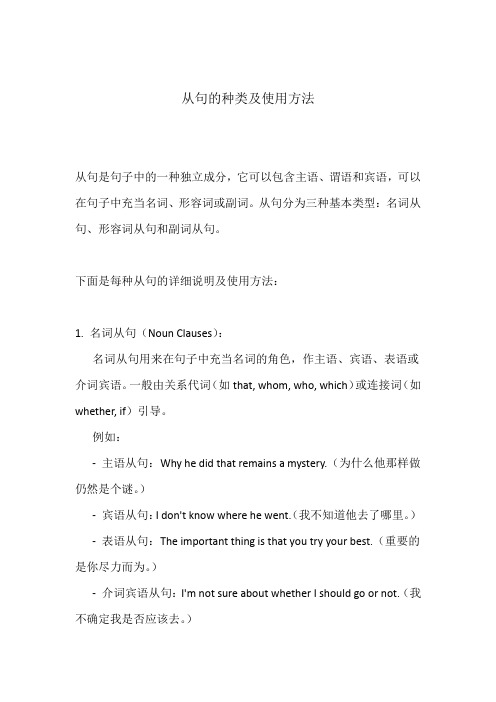
从句的种类及使用方法从句是句子中的一种独立成分,它可以包含主语、谓语和宾语,可以在句子中充当名词、形容词或副词。
从句分为三种基本类型:名词从句、形容词从句和副词从句。
下面是每种从句的详细说明及使用方法:1. 名词从句(Noun Clauses):名词从句用来在句子中充当名词的角色,作主语、宾语、表语或介词宾语。
一般由关系代词(如that, whom, who, which)或连接词(如whether, if)引导。
例如:-主语从句:Why he did that remains a mystery.(为什么他那样做仍然是个谜。
)-宾语从句:I don't know where he went.(我不知道他去了哪里。
)-表语从句:The important thing is that you try your best.(重要的是你尽力而为。
)-介词宾语从句:I'm not sure about whether I should go or not.(我不确定我是否应该去。
)2. 形容词从句(Adjective Clauses):形容词从句用来描述或修饰名词,通常由关系代词(如that, who, whom, which, whose)引导。
例如:- The book that I bought is on the table.(我买的书在桌子上。
)- He is the man who saved my life.(他是救了我命的人。
)3. 副词从句(Adverb Clauses):副词从句用来修饰动词、形容词或副词,并回答疑问词(如when, where, why, how, etc.)引导的问题。
例如:- When he arrived, everyone was already there.(当他到达时,所有人已经在那里了。
)- She speaks English better than I do.(她的英语说得比我好。
(完整版)nounclause名词性从句
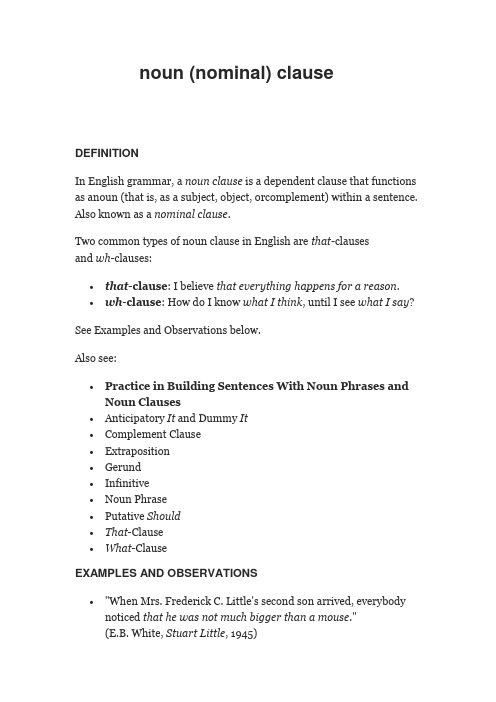
noun (nominal) clauseDEFINITIONIn English grammar, a noun clause is a dependent clause that functions as anoun (that is, as a subject, object, orcomplement) within a sentence. Also known as a nominal clause.Two common types of noun clause in English are that-clausesand wh-clauses:•that-clause: I believe that everything happens for a reason.•wh-clause: How do I know what I think, until I see what I say? See Examples and Observations below.Also see:•Practice in Building Sentences With Noun Phrases and Noun Clauses•Anticipatory It and Dummy It•Complement Clause•Extraposition•Gerund•Infinitive•Noun Phrase•Putative Should•That-Clause•What-ClauseEXAMPLES AND OBSERVATIONS•"When Mrs. Frederick C. Little's second son arrived, everybody noticed that he was not much bigger than a mouse."(E.B. White, Stuart Little, 1945)•"What I like doing most of all in the evenings, these days, is sitting in a gormless stupor in front of the television, eatingchocolate."(Jeremy Clarkson, The World According to Clarkson. Penguin Books, 2005)•"A university is what a college becomes when the faculty loses interest in students."(John Ciardi, Saturday Review, 1966)•"I know that there are things that never have been funny, and never will be. And I know that ridicule may be a shield, but it is not a weapon."(Dorothy Parker)•"I believe that there is a subtle magnetism in Nature, which, if we unconsciously yield to it, will direct us aright."(Henry David Thoreau, "Walking")•"The thought of stars contributed to the power of his feeling. What moved him was a sense of those worlds around us, our knowledge however imperfect of their nature, our sense of their possessing some grain of our past and of our lives to come."(John Cheever, Oh What a Paradise It Seems. Random House, 1982)•"Whoever was the person behind Stonehenge was one dickens ofa motivator, I'll tell you that."(Bill Bryson, Notes From a Small Island. Doubleday, 1995) •"How we remember, what we remember, and why weremember form the most personal map of our individuality."(Christina Baldwin)•"How people knew when they were being trailed he found himself unable to imagine."(Edmund Crispin [Robert Bruce Montgomery], Holy Disorders, 1945)•"This is the story of what a Woman's patience can endure, and of what a Man's resolution can achieve."(Wilkie Collins, The Woman in White, 1859)•"I knew exactly how clouds drifted on a July afternoon, what rain tasted like, how ladybugs preened and caterpillars rippled, what it felt like to sit inside a bush.”(Bill Bryson, The Life and Times of the Thunderbolt Kid.Broadway Books, 2006)•"That dogs, low-comedy confederates of small children and ragged bachelors, should have turned into an emblem of having made it to the middle class—like the hibachi, like golf clubs and a second car—seems at the very least incongruous."(EdwardHoagland, "Dogs, and the Tug of Life")•Nominal Clauses as Direct Objects- "All sentences, then, are clauses, but not all clauses aresentences. In the following sentences, for example, the directobject slot contains a clause rather than a noun phrase. These are examples of nominal clauses (sometimes called 'noun clauses'):•I know that the students studied their assignment.•I wonder what is making Tracy so unhappy.These nominal clauses are examples of dependent clauses—in contrast toindependent clauses, those clauses that function ascomplete sentences."(Martha Kolln and Robert Funk, Understanding EnglishGrammar, 5th ed., Allyn and Bacon, 1998)- "A Colorado study found that the average homeless person cost the state forty-three thousand dollars a year, while housing that person would cost just seventeen thousand dollars."(James Surowiecki, "Home Free?" The New Yorker, September 22, 2014)•Noun-Clause Starters"We use various words to start noun clauses. . . ."These words include the word that, which in its role as a nounclause starter is not a relative pronoun, for it serves nogrammatical role in the clause; it just starts the clause. Forexample: The committee stated that it would follow the agent'spolicy. Here the noun clause serves the noun role of directobject of thetransitive verb stated. But a careful look at the clause reveals that the word that does not serve any role within the clause, other than simply to get it going."Other noun clause starters do serve grammatical roles within the clause. For example: We know who caused all the trouble. Here the noun clause starter is the relative pronoun who. Notice that inside the noun clause who serves as the grammatical subject of the verb caused."Additional words serve as noun clause starters. A relativeadverb can get one going: How he won the election mystified the pundits. So can a relative pronoun acting as an adjective: Weknow which career she will pursue. In these two sentences, how is an adverb modifying the verb won, and which is arelative-pronoun-adjective modifying the noun career."(C. Edward Good, A Grammar Book for You and I--Oops,Me! Capital Books, 2002)•"I have run,I have crawled,I have scaled these city walls,These city wallsOnly to be with you,Only to be with you.But I still haven't found what I'm looking for."。
英语补足语从句

英语补足语从句英语中的补足语从句(complement clauses)通常用来补充、描述或解释主句中的名词、形容词或动词。
下面是一些常见的补足语从句的类型和示例:1. 名词性从句(Noun Clauses):作为主句中名词的补充,充当主语、宾语或介词的宾语。
- I believe that he will come.(我相信他会来。
)(作为主语) - She doesn't know what to do next.(她不知道下一步该怎么办。
)(作为宾语)- We talked about where to go for vacation.(我们讨论了去哪里度假。
)(作为介词的宾语)2. 形容词性从句(Adjective Clauses):用来修饰主句中的名词或代词,并且通常由关系词引导。
- I read a book that is really interesting.(我读了一本非常有趣的书。
)- The woman who is sitting over there is my aunt.(坐在那边的女人是我姑姑。
)3. 副词性从句(Adverb Clauses):用来修饰主句中的动词、形容词或副词,并且通常由连词引导。
- She smiled when she saw her friend.(她看到她的朋友时笑了。
)(修饰动词)- He is as tall as I thought he would be.(他和我想象的一样高。
)(修饰形容词)- They played basketball so skillfully that they won the game.(他们打得太娴熟了,以至于赢得了比赛。
)(修饰副词)值得注意的是,补足语从句的引导词会根据它在句中的角色和关系来选择不同的词,例如:that, whether, if, who, whom, whose, which, what, where, when, why, how 等。
noun clause

Tell whether the following clauses are right:
6.The reason why he was late was because his bike broke that… down halfway. 7.I don’t doubt whether/if he will come soon. that … 8. He told me the news which was very exciting. √
The Object Clause:
1.They thought that the question was too difficult. 2.I’m certain that he will get there in time. 3.She has made it clear that she does an important job. 4. I’ll do whatever you ask me to. 5.Do you know whether he’ll come or not? 6. Do you know if/whether any decision has been arrived at?
Questions:
• That she was chosen made us very happy. What caused the accident is a complete mystery. • Whether she will come or not is still a question.. • Which team will win the match is still unknown. • Whoever comes to the party will receive a present. When they will start has not been decided yet.
大学英语视听说教程1

大学英语视听说教程1大学英语视听说教程1中的重点内容1. 名词性从句 (Noun Clauses)在句子中起名词作用的从句被称为名词性从句。
名词性从句可以充当主语、宾语、表语或同位语。
例句: What he said made me angry. (宾语从句)2. 介词短语 (Prepositional Phrases)介词短语由介词及其宾语组成,在句子中作为修饰语、状语或补语使用。
它们可以描述地点、方向、时间、原因等。
例句: She walked across the bridge. (地点介词短语)3. 动词的时态和语态 (Verb Tenses and Voice)动词的时态表示动作发生的时间,包括一般现在时、过去时、将来时等。
语态表示动作的主体与承受者的关系,包括主动语态和被动语态。
例句: He will study abroad next year. (一般将来时)4. 名词的所有格 (Possessive Nouns)名词的所有格表示所属关系,通常在名词后面加上's或'来表示所有物。
例句: This is John's car. (名词所有格)5. 虚拟语气 (Subjunctive Mood)虚拟语气用于表示与事实相反的假设、愿望或建议。
常见的虚拟语气形式包括过去式、"would" + 动词原形等。
例句: If I were you, I would study harder. (虚拟语气)以上是《大学英语视听说教程1》中的一些重点内容,通过学习这些知识点,可以提高英语的听说能力。
Noun clause

三、名词性wh-从句 名词性wh1) 由 wh-词引导的名词从句叫做名词性 ) 词引导的名词从句叫做名词性wh-从句 。 wh-词包括 从句。 词包括who, 词引导的名词从句叫做名词性 从句 词包括 whom, whose, whoever, what, whatever, which, whichever等连接代 等连接代 词和where, when, how, why等连接副词。wh-从句的语法功能除了 等连接副词。 词和 等连接副词 从句的语法功能除了 从句一样外, 和that-从句一样外,还可充当介词宾语、宾语补语和间接宾语等, 从句一样外 还可充当介词宾语、宾语补语和间接宾语等, 例如: 例如: 主语: 主语:How the book will sell depends on its author. 直接宾语: 直接宾语:In one's own home one can do what one likes. 间接宾语: 间接宾语:The club will give whoever wins a prize. 表语: 表语:My question is who will take over the president. 宾语补足语:She will name him whatever she wants to. 宾语补足语: 同位语: 同位语:I have no idea when he will return. 形容词宾语: 形容词宾语:I'm not sure why she refused their invitation. 介词宾语: 介词宾语:That depends on where we shall go. 2) wh-从句作主语也常用先行词 做形式主语 , 而将 ) 从句作主语也常用先行词it做形式主语 从句作主语也常用先行词 做形式主语,而将wh-从句置于 从句置于 句末,例如: 句末,例如: It is not yet decided who will do that job.
专业英语语法:Noun Clause

二、表语从句
(1) This was what Tom was reading. (2) The truth is that I have never been there. (3) It looks as if it is going to rain. (4) The reason why he was late was that he got up late. (5) This is how we overcame the difficulties. (6) That is why she was absent yesterday. (7) The house is where Lu Xun once lived.
if / whether if / whether 1. I asked her __________ she had a bike. Whether 2.______ we will hold a party in the open air tomorrow depends on the weather. whether 3. We’re worried about ________ he is safe. 4. I don’t knowwhether ___________ he is well or not. whether 5. I don’t know ________ or not he is well. whether 6. The question is _________ he should do it. 7.The doctor can hardly answer the question whether the old man will recover soon. ______ 8.______ you are not free tomorrow, I’ll go If without you.
Noun Clauses
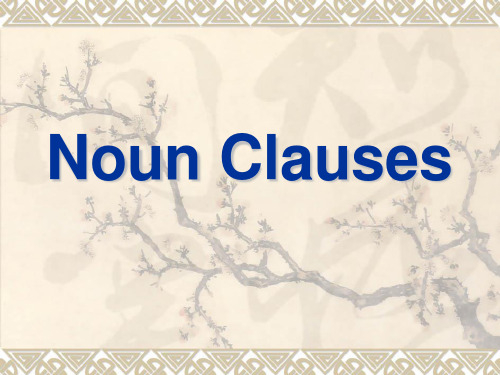
引导名词性从句的连接词
连词: 连词:
that(无任何词意) whether, if(均表示“是否”表明从句内容的不确定 性) as if ,as though(均表示“好像”,“似乎”) 以上在从句中均不充当任何成分 e.g. I insist that she (should) do her work alone. Everything depends on whether we have enough money.
That’s just what I want.
注意:当主语是 注意:当主语是reason时,表语从句要用 时 why引导而不是 引导而不是because。 引导而不是 。 e.g. The reason why he was late was that he missed the train by one minute this morning . 注意: 可引导表语从句, 注意:whether 可引导表语从句,但与之同 义的if却通常不用于引导表语从句 却通常不用于引导表语从句。 义的 却通常不用于引导表语从句。
2. 用who,whom, which, whose, what, , when, where, why, how, whoever, whatever, whichever等关联词引导的宾语 等关联词引导的宾语 从句相当于特殊疑问句, 从句相当于特殊疑问句,应注意句子语序 要用陈述语序。 要用陈述语序。 e.g. I want to know what he has told you. She always thinks of how she can work well.
Noun Clauses
Definition
在句子中起名词作用的句子叫名词性从 句 (Noun Clauses)。 名词性从句的 )。 功能相当于名词词组, 功能相当于名词词组 它在复合句中能 担任主语、宾语、表语、同位语、 担任主语、宾语、表语、同位语、介词 宾语等, 宾语等,因此根据它在句中不同的语法 功能, 功能,名词性从句又可分别称为主语从 宾语从句、表语从句和同位语从句。 句、宾语从句、表语从句和同位语从句。
Noun Clause
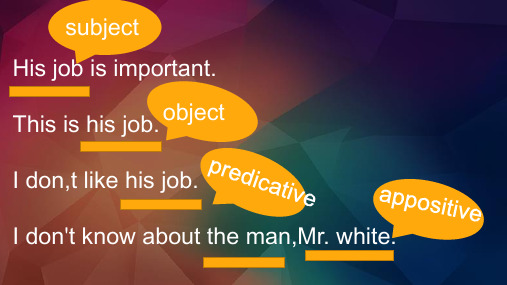
was on a three-day visit in China.
T
H
A
N
K
S
目录
1
LOREM IPSUM DOLOR
2
LOREM IPSUM DOLOR
目录
1
LOREM IPSUM DOLOR
2
LOREM IPSUM DOLOR
3
LOREM IPSUM DOLOR
目录
1
LOREM IPSUM DOLOR
LOREM
LOREM IPSUM DOLOR
LOREM
LOREM LOREM
LOREM IPSUM DOLOR
LOREM LOREM
LOREM
LOREM
LOREM
LOREM IPSUM DOLOR
LOREM
LOREM
LOREM
LOREM
LOREM
LOREM
LOREM IPSUM DOLOR
LOREM
A
B
C
LORE M
LORE M
D
E
LOREM IPSUM DOLOR
LORE M LORE M LORE M
A
B
C
LORE M
LORE M
LORE M
D
E
F
LOREM IPSUM DOLOR
Lorem ipsum dolor sit amet, consectetur adipisicing elit.Lorem ipsum dolor sit amet, conseABiblioteka LOREM IPSUM DOLOR
LOREM
LOREM
A
高中英语语法知识点归纳(一)介绍
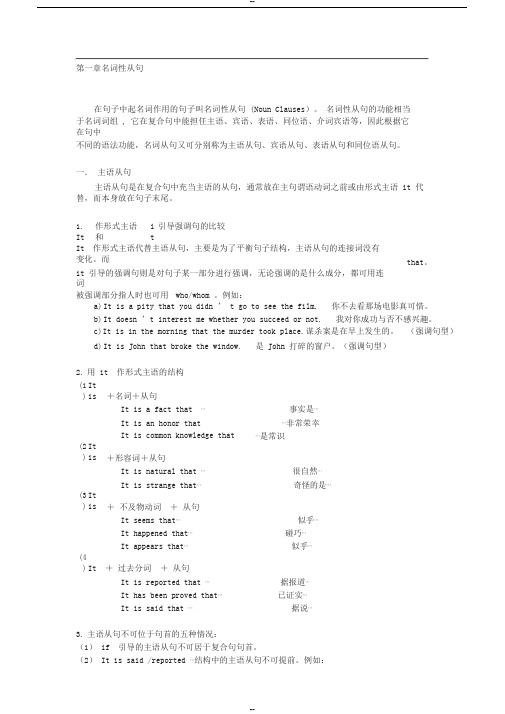
第一章名词性从句在句子中起名词作用的句子叫名词性从句 (Noun Clauses)。
名词性从句的功能相当于名词词组 , 它在复合句中能担任主语、宾语、表语、同位语、介词宾语等,因此根据它在句中不同的语法功能,名词从句又可分别称为主语从句、宾语从句、表语从句和同位语从句。
一.主语从句主语从句是在复合句中充当主语的从句,通常放在主句谓语动词之前或由形式主语 it 代替,而本身放在句子末尾。
1. It 作形式主语和it引导强调句的比较It 作形式主语代替主语从句,主要是为了平衡句子结构,主语从句的连接词没有变化。
而it 引导的强调句则是对句子某一部分进行强调,无论强调的是什么成分,都可用连词被强调部分指人时也可用who/whom 。
例如:that。
a)It is a pity that you didn ’ t go to see the film. 你不去看那场电影真可惜。
b)It doesn ’t interest me whether you succeed or not. 我对你成功与否不感兴趣。
c)I t is in the morning that the murder took place.谋杀案是在早上发生的。
(强调句型)d)It is John that broke the window. 是 John 打碎的窗户。
(强调句型)2.用 it 作形式主语的结构(1 )Itis +名词+从句It is a fact that ⋯事实是⋯It is an honor that ⋯非常荣幸It is common knowledge that ⋯是常识(2 )Itis +形容词+从句It is natural that ⋯很自然⋯It is strange that⋯奇怪的是⋯(3 )Itis +不及物动词+从句It seems that⋯似乎⋯It happened that⋯碰巧⋯It appears that⋯似乎⋯(4)It +过去分词+从句It is reported that ⋯据报道⋯It has been proved that⋯已证实⋯It is said that ⋯据说⋯3.主语从句不可位于句首的五种情况:(1) if 引导的主语从句不可居于复合句句首。
- 1、下载文档前请自行甄别文档内容的完整性,平台不提供额外的编辑、内容补充、找答案等附加服务。
- 2、"仅部分预览"的文档,不可在线预览部分如存在完整性等问题,可反馈申请退款(可完整预览的文档不适用该条件!)。
- 3、如文档侵犯您的权益,请联系客服反馈,我们会尽快为您处理(人工客服工作时间:9:00-18:30)。
Chapter XV. Noun Clauses1.Our hometown has changed a lot, and now it is quite different from _____ a few years ago.A. that it used to beB. what it used to beC. which it used to beD. what was it2.These photos will show you _____.A. how does our village look likeB. how our village looks likeC. what does our village look likeD. what our village is like3.It makes no difference _____ you will go today or tomorrow.A. ifB. whetherC. thatD. either4.All the books are here. You may borrow _____ you like.A. whichB. thatC. whatD. whichever5.The teacher told the students that the sun _____ a great amount of light and heat.A. gave offB. sent outC. gave outD. gives off6.I have no idea _____ he will start.A. whenB. thatC. whatD. /7.Can you tell me _____ size shoes you wear?A. whatB. whichC. thatD. in which8.He hoped _____ with him.A. Jenny to goB. Jenny’s to goC. Jenny goD. that Jenny would go9.Dad made a promise _____ he would buy me a computer.A. /B. whichC. thatD. what10.It matters little _____ a man dies, but _____ matters much is _____ he lives.A. how; what; howB. how; it; howC. why; it; whyD. that; what; that11._____ he was chosen made us very happy.A. WhoB. WhomC. WhatD. That12.It remains unknown _____ Mike didn’t go swimming yesterday.A. whyB. thatC. whichD. what13.I’ve come from the government with a message _____ the meeting won’t be held tomorrow.A. ifB. whetherC. whyD. that14.This is _____ Asia and Africa meet.A. thatB. the placeC. whatD. where15.It worried her a bit _____ her hair was turning grey.A. whileB. ifC. thatD. for16.What he felt me _____ but a few old books.A. isB. areC. hasD. have17.Can you point out _____ two radios are the best?A. whichB. whatC. thatD. whether18.I asked her in English _____ she was, and she told me _____ she was an actress.A. who; thatB. who; /C. what; /D. how; that19.Now there is a danger _____ the ground may fall in under the heavy traffic.A. whetherB. itC. /D. that20.The true value of life is not in _____, but _____.A. how you get; that you giveB. which you get; what you giveC. what you get; what you giveD. what do you get; what do you give21.The question is _____ to land on the grassland.A. if it is safeB. if is it safeC. whether it is safeD. whether is it safe22.We can see your factory from _____ we live.A. whereB. thatC. /D. what23._____ we need more practice is quite clear.A. WhenB. WhatC. ThatD. /24.Air, or _____ is called the atmosphere, surrounds the whole world.A. thatB. whichC. whatD. it25._____ certain that his invention will lead to the development of production.A. That’sB. This isC. It’sD. What’s26._____ a pity you missed the lecture made by Professor Brown.A. That’sB. It’sC. There’sD. What’s27.It’s strange ____ this book.A. that no one should likeB. that no one likedC. that why no one likesD. why no one likes28.It’s suggested that the experiment _____ under low temperature.A. makesB. is madeC. be madeD. made29.The trouble is _____ we are short of hands.A. whatB. thatC. howD. why30.That is _____I had to leave my motherland.A. whyB. reason whyC. howD. what31.I’ll give his dictionary to _____ wants to have it.A. whomeverB. whoeverC. whomD. whichever32.Take _____ much you want and _____ you want to.A. however; whenB. whenever; howC. however; whoeverD. however; whenever33.Do _____ you think is right _____ difficulties you may have.A. what; howeverB. that; whateverC. whatever; whoeverD. what; whatever34.The thought _____ he might fail in the examination worried him.A. whichB. thatC. whenD. so that35.His suggestion _____ to see the art exhibition interested every one of us.A. which we should goB. that we goC. that we would goD. when we would go36.It was _____ he worked hard that he succeeded.A. becauseB. thatC. asD. for37.Word came _____ President Jiang Zemin would come to inspect us.A. thatB. whenC. whichD. how38.I wish I _____ yesterday’s lecture.A. were able to attendB. had been able to attendC. attendedD. could attend39.Do you know what time _____?A. does the football match beginB. begins the football matchC. the football match beginsD. will the football match begin40.Ask him how much _____?A. did you costB. costC. it costD. it costed41.I wrote to him the day before yesterday. I wonder why he _____.A. didn’t ring upB. hadn’t rung upC. hasn’t rung upD. doesn’t ring up42.The teacher said that the sun _____ in the east and _____ in the west.A. rose; setB. rises; setsC. raises; setsD. raised; set43.He has come, but I didn’t know that he _____ until yesterday.A. is comingB. will comeC. was comingD. wasn’t coming44.He ran back into the room to see if he _____ anything behind.A. has forgottenB. had forgottenC. has leftD. had left45.I did _____ I could _____ the orphan.A. that; take care ofB. and; take care ofC. what; to take care ofD. what; take care of46.He told me that I _____ better take a taxi.A. would haveB. should haveC. had hadD. had47.I doubt _____ we’ll win the match.A. whetherB. thatC. whatD. /48.I don’t doubt _____ it is true.A. whetherB. ifC. thatD. what49._____ will take part in this English speech contest will be announced over the radio.A. WhoeverB. WhoC. WhichD. Those50._____ knows the secret will come here to have meeting.A. WhoeverB. ThoseC. EveryoneD. AnyoneAnswers:1-10: BDBCD AADCA 11-20: DADDC BACDC 21-30: CACCC BACBA 31-40: BDDBB AABCC 41-50: CBCDC DACBA。
